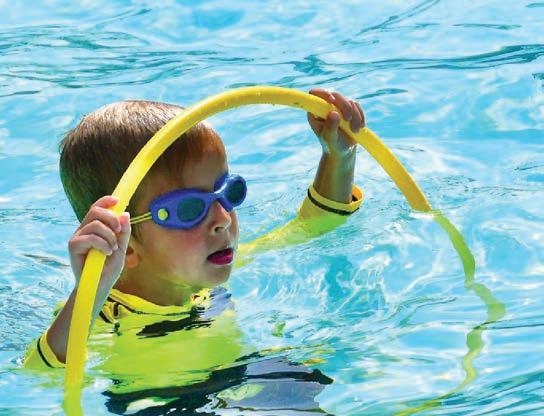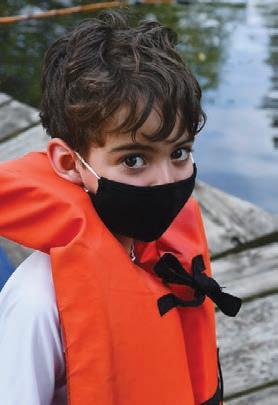
7 minute read
Kids Need Camp
CAMP GUIDE
Summer camp can be a lifeline for families. Children blossom in a child-centered environment that isn’t school, and parents relish the respite from everyday childcare responsibilities.
Advertisement
So, in the summer of 2020, the closing of most camps due to the COVID-19 pandemic was devastating on many levels. Many of those described their decision to close as “heartbreaking.”
At least two camps serving the Detroit-area Jewish community did open last summer: Willoway Day Camp, a private camp in Milford, and Camp Gan Israel, an overnight camp in Kalkaska affiliated with the Chabad movement.
Others, forced to close last summer, are cautiously optimistic that they will be able to operate at least a scaled-down program next summer.
Lorraine Fisher, who, with her husband, Arnie, has operated Willoway Day Camp since 1969, spoke for most of her colleagues when she said, “Kids need camp.”
Willoway’s assistant director, Jonathon Koenigsberg, served on a committee appointed by Gov. Gretchen Whitmer to establish guidelines for opening camps, so he knew earlier than most what needed to be done.
Willoway cut back from its normal enrollment of more than 250 children to about 150 per session. Pods of 10 campers, aged 5-14, and two counselors did most of their activities together. For larger gatherings, everyone masked up and stayed socially distanced.
Every morning, parents completed a detailed health
Benji Schostak of West Bloomfield has fun in the pool at Camp Willoway.








COURTESY OF CAMP WILLOWAY


Camps “cautiously optimistic” about the summer of 2021.


BARBARA LEWIS CONTRIBUTING WRITER
form, including the child’s temperature, and kept the child home if there was any hint of illness. When camp buses made pickups in synagogue and shopping center parking lots, parents stayed in their cars. Siblings were the only ones allowed to share seats on the bus.
Sleepovers, previously a camp highlight, were canceled.
“We had to buy lots of equipment for sanitizing,” Fisher said. “Buses were sanitized every day. Whenever we used a piece of equipment we sanitized it.” Children frequently washed their hands, singing the camp song as they did to make sure they scrubbed long enough.
The children’s experience made the effort worthwhile. “If you could have seen those kids in the first week,” said Fisher. “[When schools closed] they had been home for three months. They learned to play again.”
Bentzion Shemtov and his wife, Simi, onsite directors of Camp Gan Israel, worked closely with state licensing officials and the Kalkaska County health department.
The camp serves more than 500 campers, ages 7-13, in two sessions, one for boys and one for girls.
All were required to have a COVID test a week before camp and then to isolate at home until camp started. On the way to camp, all campers and staff were tested at a site set up by William Beaumont Hospital Troy, which promised fast results; no one tested positive.
Once they got to camp, the campers and staff operated as a “bubble,” with no one from the outside coming or going. Popular out-of-camp trips, to Michigan nature spots, water parks, Cedar Point and more, were canceled.
Anyone who had a fever or sniffles — inevitable in any community of hundreds of children — was tested immediately, and no one tested positive, Shemtov said.
Camp Tanuga, also in Kalkaska, tried hard to open last summer but wasn’t able to pull it off.
As late as the beginning of June, the managers still hoped to run a single five-week session starting in mid-July. They were waiting for written guidelines from state and local health officials to nail down the details. Eventually time ran out.
“It takes us about 30 days to get up and running. That’s without COVID precautions,” said Mark Coden. He and his co-director, Sid Friedman, waited until the afternoon of June 11, about 36 hours past their deadline, before finally deciding to cancel the season.
They are hoping to avoid a repeat next summer.
“We feel it’s more important than ever that parents find a safe program to send their children to,” Coden said. “Kids need a place to go to regain their childhood. Get them outdoors and screenfree!”
He urged families to regcontinued on page 18
COURTESY OF CAMP WILLOWAY

Jack Singer of Birmingham at Camp Willoway

CAMP GUIDE

PHOTOS COURTESY OF CAMP WILLOWAY
Ben Moor of Bloomfield Hills

Joey Fearon of Birmingham enjoys a craft project at Camp Willoway. Alexa Schafer of Birmingham
— WILLOWAY’S LORRAINE FISHER
continued from page 16 ister early because space will likely be limited. Fees paid for last summer can be rolled over to 2021.
Several camps tried to make up for canceling their sessions last year by implementing virtual programs.
Roeper Schools in Bloomfield Hills normally serves 400 children, ages 3-12, in its day camp and another 100, ages 4-14, in a theater camp. Last summer, they ran one-hour online programs offered in four timeslots every weekday. Participants could sign up for one hour or for several.
About 250 children enrolled in the virtual programs, said Paula Romano, Roeper’s director of auxiliary programs, including some from out of state. It worked so well that Roeper plans to do it again this summer, even as they hope to reopen the onsite day camps.
OTHER JEWISH CAMPS
Last summer would have been the 60th season for Camp Ramah in Canada, affiliated with the Conservative movement, which normally serves nearly 600 children ages 7-16. When the camp was forced to close by the Ontario government, they implemented a threeweek virtual program in which 150 enrolled.
“We know how important camp is, and we’re doing everything we can to carefully and cautiously open next summer,” said Aviva Millstone, associate director.
Camp Young Judaea Midwest in Waupaca, Wis., also ran an online program
Cassidy Tuthill of Bloomfield Hills and Josh Lipson of West Bloomfield get in some fishing at Camp Willoway. Zachary Dorf of West Bloomfield


called Virtual Explorers. “Any child could join us for two hours a day to engage in fun, interactive programming,” said Robin Anderson, director. “Our programs included cooking, escape rooms, maker space, krav maga, art, Shabbat events and much more.”
The camp hopes to open next summer, and is working with state public health officials and the American Camp Association to develop plans.
Habonim Dror Camp Tavor in Three Rivers, Mich., offered a four-week virtual session as well as a family camping program last summer. “We adapted our multi-day bike ride to a oneday bike ride and developed a brand new cabin rental program, providing camp families and alumni with a unique, safe and nourishing opportunity” to enjoy the camp grounds, said Amit Weitzer, executive director.
Tavor is consulting with the camps that operated in 2020, as well as with the Centers for Disease Control and the American Camp Association, to develop plans for next summer. “We know our campers and community need camp now more than ever before,” said Weitzer.
Anna Singer of Birmingham, parent of Willoway campers Sam, 8, and Jack, 6, agreed.
“You are true superheroes,” she said in a note to the directors. “You have given us hope and courage that our kids will come through this hurdle of life on the upswing. Camp gave our children purpose, much needed socialization and challenged them.”










